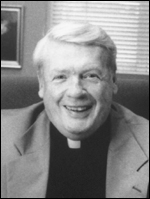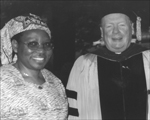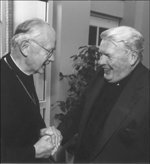
|
| Vincent Cushing
|
On a warm June day, Vincent de Paul Cushing, O.F.M, retiring president of Washington Theological Union, sat down with In Trust editor William R. MacKaye in a sitting room of the Franciscan friary in Silver Spring, Maryland, where he makes his home. As is his custom at relaxed moments, Cushing was wearing sports clothes. The two began to talk about Cushing’s thoughts as he looks back on his twenty-four years as head of the Roman Catholic “school for ministry,” as WTU calls itself.
Cushing: When you lay out to people—clergy or laity—what theological education for ministry is about, their tendency is to talk about the need for excellence in education. Even though it may not be part of the general awareness of Americans, they seem to have a pretty clear idea of the role that religion and values play in American life. Therefore there’s a genuine need for excellence in the education of people bound for religious ministry whether they are candidates for ordination or people who’ll be working on congregational staffs. There’s a genuine need for excellence in terms of theological education. They want people in ministry who know values, who can participate in contemporary society, who are skilled in one-to-one counseling, who are at least able to handle their own human problems reasonably, and who can observe—it’s the current cliche but it’s true—boundaries in terms of working with other people.
At the present time, We have at the Washington Theological Union a couple of benefactors who have made significant—five- and six-figure—gifts to the Union. In both cases the donors’ major concern is excellence. And their approach is, one way or the other you’re going to figure out what you got to do financially but we will not support you if you are not reaching for excellence. That’s not theoretical excellence. What they mean is getting people educated, looking for the best and the brightest, dealing with society in a realistic way, and doing the hard homework in the hiring of good faculty that will yield the assurance that their investment is not wasted on frivolous approaches to education.
I’ve also been encouraged by the willingness of religious communities of men and women to put resources into the education of lay people. At the Union five religious orders have agreed to provide scholarship money for laity. They accept that the composition of the ministry will be changing in the future and that it’s going to be much more a collaborative approach in which all partners have to be equal in terms of their ability to work together. Inevitably, where that happens there will be a change in the understanding of the nature of the local church. Lay people will view it as “our” church, not “their” church.

|
| President Cushing in academic regalia, with Sister Chizoba Onvorah, S.H.C.J., a student from Nigeria.
|
MacKaye: In terms of this rise of people aspiring to lay ministry—unordained ministry—and particularly as this is working itself out among Roman Catholics, is this simply something which has developed because of a reluctance of persons to offer themselves for the priesthood as it is presently constituted and as the present rules are enforced? Or does it represent some kind of sea change in terms of what people’s understanding of what, one, ministry and, two, priesthood is?
Cushing: It’s hard to say empirically. Dean Hoge at Catholic University says, I think in his book The Future of Catholic Leadership, that there are as many altruistic young people around now as there were in 1955, but only one-tenth as many now would be interested in religious life or the life of a celibate priest. These days people can make altruistic choices for a period of time that forty years ago people thought had to be a lifelong choice. For example, they can offer themselves to the Franciscan Volunteer Service or Jesuit Missions or Maryknoll, go and work with these communities for five to ten years and then come back and marry, raise a family, begin, you might say, a standard career within American society.
MacKaye: Do such volunteer programs have a system of spiritual formation, and that kind of thing, associated with them?
Cushing: Well, certainly the director of such a program would be very concerned with the Christian discipleship of the volunteers, in the sense of motivating them that their volunteerism would flow from their spiritual life and their life of dedication. Participants in such volunteer programs are usually permanently marked by that sense of altruism and involvement in issues of social justice, and the quality of their faith and their discipleship is significantly intensified and changed by the hands-on experience. And that’s with no view of having them become Franciscan or anything else, it’s just to recognize that they are co-disciples with us and that that’s the nature of society, as such, that clergy can’t handle by themselves anymore—at least in the Catholic world in which the number of clergy still declines and the number of Roman Catholics, especially because of immigration, increases.
There seems to be a marked increase in Roman Catholic lay people—indeed, now we’re beginning to see it in Protestant churches too—who participate in some way in the public ministries of the church without seeking ordination.
Last year, according to CARA [the Center for Applied Research in the Apostolate], 509 men were ordained for the Catholic priesthood in the United States. Last year, in programs for ministry in which Catholic laity were involved—that could be everything from, say, a little parish program training laity to conduct Bible study, to people who might be seeking research doctorates in order to participate in the ministry—there were over 23,000 participants. It doesn’t prove the case but it certainly gives one pause.
You look at that development and you say, where is that coming from? What’s happening here? Some of that might well arise from the awareness that the church is not the property of the clergy, that it is truly the people of God.
MacKaye: Let me push you back again to the question of excellence and the presidential role. It strikes me that you can say our focus has to be on excellence but with you as president, when’s all said and done, what control do you have over who is proposing to come to the school as a student? What control do you have over who ends up on your faculty? There are so many forces pushing here that I would think these goals might be a recipe for total frustration. You know, you want excellence but the excellent aren’t applying. Or, you want excellence but you can see that Dr. So-and-so is a complete fathead and how in the world did he ever get on your faculty and how can you get him out of here? He has tenure.
Cushing: There are only a few ways you can really go at it. One is by pushing with your own staff the need to maintain standards in admissions. How do you make sure that you’re not just taking in people who are really not capable either intellectually or, indeed, in terms of personal character? It’s a tough issue.
To the credit of the religious orders that I work with, if they have a person who is not up to par intellectually, or in terms of academic ability, and if we as a school say that person can’t do it, they will accept our judgment on it.
How to gauge the amount of pressure being exerted to come up with ordained people in the Catholic Church is a hard thing to gauge. It’s fraught with problems because there is such an insistence that we need ordained people coupled with a refusal to examine other questions of the discipline that governs the ordained ministry.
In regard to faculty, the issue isn’t exactly the same. I do sense that by putting together a good faculty senate, and a good appointments and promotion committee, and a good faculty review system, internally in a school, you can come up with some judgments about the quality of faculty. In a well-running system, it seems to me, you can come up reasonably—maybe in 75 percent of the cases—with faculty who are able to carry out or able to present a quality educational program.
In Roman Catholicism today faculties in theology and faculties for seminaries are passing from clerical to lay hands. If one goes to the meetings of, say, the Catholic Theological Society of America, we see that the shift in that association is clearly toward lay people who have done doctoral work in both Catholic and Protestant universities in this country and abroad. Catholic theology is no longer the domain of ordained clergy. One effect of the shift is that while there’s no lack of good theology teachers, there is sometimes a lack of the financial wherewithal to pay a good lay teacher.
Among lay scholars there’s also some fear of going into Roman Catholic teaching on either the seminary or the university level because of the danger that either one gets unexpectedly reviewed or perhaps terminated because of a kind of church review that is hard to control beyond the church.
MacKaye: Wait a minute. What do you mean by “hard to control beyond the church”?

|
|
Cushing welcomes Washington’s archbishop, Cardinal James Hickey, to a dinner honoring the retiring president.
|
Cushing: In other words, that the church has a system of doctrinal review or ethical review that is not governed by university standards, or at least does not accept the standards that are prevalent here in America. And questions of due process are important. In the case of the United States, some of the processes are present on paper and agreed to between theologians and the American Catholic bishops, but they are not necessarily being enforced or implemented. So, when you get a good young scholar who’s got a fine doctoral degree and is really eager to teach and to participate in the training of personnel and ministers for the church, you may find a strong hesitation to join the faculty of a Catholic institution.
MacKaye: Let me toss a different kind of question at you. For a number of years WTU operated in rented space way out in suburban Maryland. Then it moved into the Takoma Park section of Washington, into its building. Was the school changed by this experience?
Cushing: The school came to a sense of maturity, I guess. By that I mean, it embraced its own identity as something that was not a temporary clustering of religious institutes of men in rented space but rather a permanent institution that had its own space, its own programs, its responsibility for its own support, its own sensible autonomy. All of those led to a sense of the maturing of the institution so that it doesn’t view itself as something, anymore, that might pass from the American scene purely because of problems of finances, let’s say. That’s not to say that prior problems of finance don’t exist. The budget of the Union is still very tight and, indeed, made more tight by the new building.
But the new building—the chapel, dining room, especially, adequate space for faculty, adequate space for meetings—has said to everybody, here we are and we’re going to stay here and we’re going to continue to be a voice within the American Catholic educational system for ministry. We’ve been in that building now for three years now, and it seems to me that as the years go on we come to a deeper and deeper sense of the role we play in the Catholic church and, indeed, of late, in the society, reflecting on the ethical concerns of the nation’s capital.
In its twenty-seventh year, the Washington Theological Union moved, and the move was a do-or-die move, either become an institution or go out of existence. It’s the end of the founders’ era. I’m the last of the founding professors and the only surviving former president.
MacKaye: What do you suppose your biggest mistake was?
Cushing: That’s a tough question.
MacKaye: I’d be interested particularly in your describing a mistake that might steer somebody reading this article away from making the same mistake.
Cushing: My biggest mistake was a sin of omission. It was not opening up the board of trustees early enough to gifted laity. I’m not sure the culture would have permitted it in 1975, but I should have started immediately recruiting to the board genuinely dedicated Catholic lay people who believed in the progressive mission of our school, rather than waiting seven or eight years. Then they could have been conversation partners with me and with the faculty as we went forward. Then I have to admit as well that I leave the Union feeling that I still didn’t get the finances right.